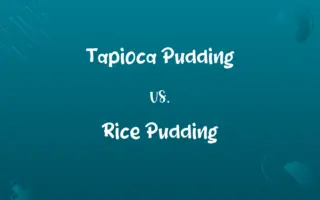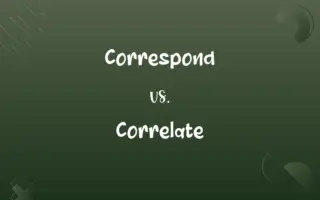Conductor vs. Insulator: Know the Difference

By Shumaila Saeed || Published on February 12, 2024
A conductor allows electrical or thermal energy to flow through it easily, while an insulator resists this flow.

Key Differences
A conductor is a material that permits the flow of electric charges in one or more directions. For example, metals like copper and aluminum are good conductors of electricity, which is why they are commonly used in electrical wiring. An insulator, on the other hand, is a material that resists the flow of electric charge. Materials like rubber, glass, and plastic are good insulators, often used to coat or encase electrical wires to prevent accidental shock.
Shumaila Saeed
Feb 12, 2024
In terms of heat transfer, conductors are materials that allow heat to pass through them easily. Metals, again, are good thermal conductors, which is why cooking utensils are often made from metal. Insulators are materials that are poor conductors of heat. They are used to keep heat in or out, like in the case of thermal insulation in buildings.
Shumaila Saeed
Feb 12, 2024
In electrical circuits, a conductor is used to make connections and allow the flow of current. Its ability to conduct electricity efficiently makes it integral to the functioning of electronic devices. Insulators are used to prevent the undesired flow of current and to protect against electrical hazards. They are essential for safety in electrical systems, providing a barrier between electrical conductors and users.
Shumaila Saeed
Feb 12, 2024
Conductors and insulators can be found in all physical states: solid, liquid, and gas. However, the most effective conductors are usually metals (solid), while insulators are often found in a variety of forms like rubber (solid), oil (liquid), and air (gas). Each material's atomic structure determines its ability to conduct or insulate.
Shumaila Saeed
Feb 12, 2024
Both conductors and insulators play crucial roles in modern technology. Conductors are key in the transmission and distribution of electrical power, while insulators are vital in ensuring the safe use of that power. The proper selection and application of these materials are fundamental to the functioning of electrical devices and systems.
Shumaila Saeed
Feb 12, 2024
ADVERTISEMENT
Comparison Chart
Use in Circuits
To make connections, allow current flow
To prevent undesired current flow, protect against hazards
Shumaila Saeed
Feb 12, 2024
Physical States
Mostly solids (metals)
Various forms (solids, liquids, gases)
Shumaila Saeed
Feb 12, 2024
ADVERTISEMENT
Conductor and Insulator Definitions
Conductor
An element or compound with free-moving charged particles.
Silver is the best conductor of electricity but is too expensive for common use.
Shumaila Saeed
Jan 25, 2024
Insulator
A material that resists the passage of electric current.
Plastic is used as an insulator for electrical wiring.
Shumaila Saeed
Jan 25, 2024
Conductor
Anything that can transfer energy from one form to another.
Water can be a conductor of thermal energy.
Shumaila Saeed
Jan 25, 2024
Insulator
A material used to reduce or prevent the transmission of sound.
Foam is an effective insulator against noise.
Shumaila Saeed
Jan 25, 2024
Conductor
A material that permits the flow of electricity.
Copper wires are used as conductors in electrical cables.
Shumaila Saeed
Jan 25, 2024
ADVERTISEMENT
Insulator
An object that does not allow the free movement of electrons.
Rubber gloves are used as insulators in electrical work.
Shumaila Saeed
Jan 25, 2024
Conductor
A substance that allows heat to pass through it.
The metal pot is a good conductor of heat for cooking.
Shumaila Saeed
Jan 25, 2024
Insulator
A compound that inhibits the flow of thermal energy.
Air trapped in double-glazed windows acts as an insulator.
Shumaila Saeed
Jan 25, 2024
Insulator
A substance that prevents the transfer of heat.
Fiberglass is commonly used as an insulator in buildings.
Shumaila Saeed
Jan 25, 2024
Insulator
A material that insulates, especially a nonconductor of sound, heat, or electricity.
Shumaila Saeed
Jan 22, 2024
Conductor
(Physics) A substance or medium that conducts heat, light, sound, or especially an electric charge.
Shumaila Saeed
Jan 22, 2024
Insulator
A substance that does not transmit heat (thermal insulator), sound (acoustic insulator) or electricity (electrical insulator).
Shumaila Saeed
Jan 22, 2024
Insulator
A non-conductive structure, coating or device that does not transmit sound, heat or electricity (see image)
To isolate electrical wires from the pylons supporting them, one often uses glass insulators.
Shumaila Saeed
Jan 22, 2024
Conductor
(music) A person who conducts an orchestra, choir or other music ensemble; a professional whose occupation is conducting.
Shumaila Saeed
Jan 22, 2024
Conductor
(rail transport) A person who takes tickets on public transportation and also helps passengers.
Train conductor
Tram conductor
Shumaila Saeed
Jan 22, 2024
Conductor
(physics) Something that can transmit electricity, heat, light, or sound.
Shumaila Saeed
Jan 22, 2024
Insulator
A substance or object that insulates; a nonconductor; as, polyurethane foam is a popular thermal insulator.
Shumaila Saeed
Jan 22, 2024
Conductor
(mathematics) An ideal of a ring that measures how far it is from being integrally closed
Shumaila Saeed
Jan 22, 2024
Insulator
A material such as glass or porcelain with negligible electrical or thermal conductivity
Shumaila Saeed
Jan 22, 2024
Conductor
A grooved sound or staff used for directing instruments, such as lithontriptic forceps; a director.
Shumaila Saeed
Jan 22, 2024
Conductor
One who, or that which, conducts; a leader; a commander; a guide; a manager; a director.
Zeal, the blind conductor of the will.
Shumaila Saeed
Jan 22, 2024
Conductor
One in charge of a public conveyance, as of a railroad train or a street car.
Shumaila Saeed
Jan 22, 2024
Conductor
A substance or body capable of being a medium for the transmission of certain forces, esp. heat or electricity; specifically, a lightning rod.
Shumaila Saeed
Jan 22, 2024
Conductor
A grooved sound or staff used for directing instruments, as lithontriptic forceps, etc.; a director.
Shumaila Saeed
Jan 22, 2024
Conductor
A material that facilitates the transmission of sound waves.
In a stringed instrument, the strings act as conductors of vibration.
Shumaila Saeed
Jan 25, 2024
Repeatedly Asked Queries
Are conductors always solid?
Conductors can be solid, liquid, or gas, but solid metals are the most effective.
Shumaila Saeed
Feb 12, 2024
Do all metals conduct electricity?
Most metals are good conductors of electricity, but not all.
Shumaila Saeed
Feb 12, 2024
Do insulators have free electrons?
Insulators have very few free electrons.
Shumaila Saeed
Feb 12, 2024
Can plastic conduct electricity?
Plastic is generally an electrical insulator.
Shumaila Saeed
Feb 12, 2024
Is air an insulator or a conductor?
Air is normally an insulator but can become a conductor under high voltage.
Shumaila Saeed
Feb 12, 2024
Is aluminum foil a good conductor?
Yes, aluminum foil is a good conductor of both electricity and heat.
Shumaila Saeed
Feb 12, 2024
Why are power lines made of conductive materials?
Power lines are made of conductive materials to efficiently transmit electricity.
Shumaila Saeed
Feb 12, 2024
Is copper a better conductor than iron?
Yes, copper is a better conductor of electricity than iron.
Shumaila Saeed
Feb 12, 2024
Can a conductor become an insulator?
Under certain conditions, such as extreme temperatures, a conductor can behave like an insulator.
Shumaila Saeed
Feb 12, 2024
Can insulators conduct electricity under any condition?
High voltage or temperatures can cause some insulators to conduct electricity.
Shumaila Saeed
Feb 12, 2024
Can water be a conductor?
Water, especially if impure or salty, can be a conductor.
Shumaila Saeed
Feb 12, 2024
Why are metals used as conductors in wiring?
Metals are used due to their high electrical conductivity and durability.
Shumaila Saeed
Feb 12, 2024
What are superconductors?
Superconductors are materials that conduct electricity with no resistance under certain conditions.
Shumaila Saeed
Feb 12, 2024
Why are insulators used in electrical appliances?
Insulators are used in electrical appliances for safety to prevent electrical shocks.
Shumaila Saeed
Feb 12, 2024
Can a conductor be used as an insulator at low temperatures?
Some conductors can act as insulators at very low temperatures.
Shumaila Saeed
Feb 12, 2024
What makes a material a good insulator?
A good insulator has a high resistance to the flow of electricity and heat.
Shumaila Saeed
Feb 12, 2024
Is rubber a natural insulator?
Yes, rubber is a natural insulator for electricity.
Shumaila Saeed
Feb 12, 2024
Are ceramics good insulators?
Yes, ceramics are good electrical and thermal insulators.
Shumaila Saeed
Feb 12, 2024
Share this page
Link for your blog / website
HTML
Link to share via messenger
About Author
Written by
Shumaila SaeedShumaila Saeed, an expert content creator with 6 years of experience, specializes in distilling complex topics into easily digestible comparisons, shining a light on the nuances that both inform and educate readers with clarity and accuracy.






































































